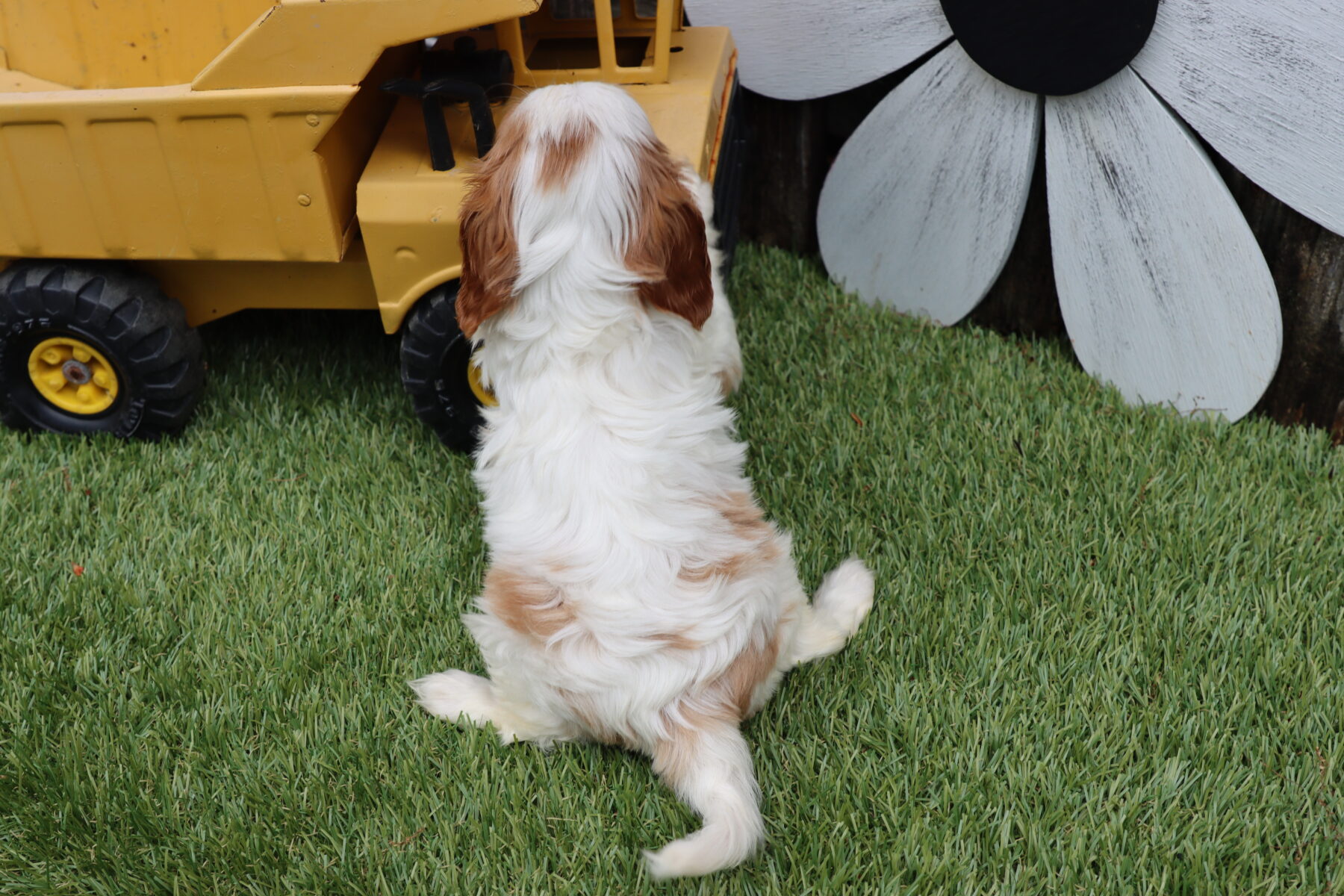
So, you’ve just brought home a Cavalier King Charles Spaniel puppy. You’ve made a wonderful decision: these dogs are known for their charming personalities and affectionate nature. Because of these unique traits, they tend to be wonderful companions that have their own distinct personality. This will, of course, affect how they respond to training.
If you want your Cavalier to thrive and be well-behaved, you’re going to need to personalize your training. Luckily, we at Carlisle Cavaliers are here to provide you with some best practices to tailor your training to your Cavalier’s personality. Read on if you want to raise a happy and well-behaved pet.
Understanding Your Cavalier’s Personality
Cavaliers are known for being affectionate, playful, and sensitive. These traits can vary in intensity from one dog to another, making it important to observe and understand your dog’s temperament. By recognizing these personality traits, you can tailor your training approach to suit their unique needs.
Assessing Your Cavalier’s Temperament
To tailor your training approach, you first need to assess your dog’s temperament. This involves observing their behavior in different situations and interactions to understand the genetic traits that have been handed down to them.
Techniques for Assessing Temperament
First, observe how your Cavalier reacts to new people, new environments, and different stimuli. And then spend some time interacting with them through play, commands, and general socialization to gauge how they respond.
Identifying Key Traits
Is your Cavalier more playful or reserved? Do they show a strong attachment to you or are they more independent? Understanding these key traits can help you determine the best way to approach their training.
Impact on Learning Style
Playful dogs may respond well to training methods that incorporate games, while sensitive dogs might benefit from a gentle and calm approach. By tailoring your training to their learning style, you can make the process more enjoyable and effective for you both.
Personalized Training Approaches
Once you’ve assessed your Cavalier’s temperament, you can adapt your training methods to match their personality.
Training Affectionate Cavaliers
Affectionate Cavaliers respond well to positive reinforcement and social interaction. Use treats, praise, and affection to reward good behavior. Social activities like puppy playdates can also be beneficial.
Training Playful Cavaliers
Playful Cavaliers thrive on interactive training methods. Incorporate games and active learning into your sessions to keep them engaged. Activities like fetch, agility exercises, and puzzle toys can make training fun and effective.
Training Sensitive Cavaliers
Sensitive Cavaliers require a calm and gentle approach. Use soft commands and a soothing tone to avoid overwhelming them. Creating a peaceful training environment with minimal distractions can help them focus and learn better.
Building a Training Routine
Consistency and routine are key to successful training. Establishing a daily training schedule tailored to your Cavalier’s needs will help reinforce good behavior and create a sense of stability.
Importance of Consistency
Regular training sessions help your Cavalier understand what is expected of them. Consistent commands and rewards reinforce learning and make training more effective.
Creating a Daily Training Schedule
Plan short, frequent training sessions throughout the day. Balance training with playtime and rest to keep your Cavalier mentally and physically stimulated without overwhelming them.
Using Positive Reinforcement
Positive reinforcement is one of the most effective training methods for Cavaliers. It involves rewarding your dog for good behavior, which encourages them to repeat that behavior. This method strengthens the bond between you and your dog, making training a positive experience. It also helps build your Cavalier’s confidence and trust.
Tips for Using Treats, Praise, and Toys
Use small, high value treats to reward good behavior. Praise and affection can also be powerful motivators. Incorporate your dog’s favorite toys into training sessions to keep them engaged and motivated.
Addressing Behavioral Challenges
Like most dogs, Cavaliers will face their share of problems. The two most common are separation anxiety and excessive barking. Separation anxiety happens when a dog becomes very attached to its owner and experiences anxiety when left alone. Excessive barking, meanwhile, may be the result of boredom, anxiety, or desire for attention.
Tailoring Solutions
For separation anxiety, try to gradually get the pup used to being alone for short periods of time, perhaps with some comfort items to keep them occupied. If barking is the problem, identify the cause and address through a combination of training and environmental adjustments. This may take time but keep at it. Be consistent in you efforts and celebrate the small victories as you go.
Socialization as Part of Training
Socialization is a crucial aspect of training that helps your Cavalier become a well-rounded and confident dog. Incorporate socialization into your training routine by exposing your Cavalier to different people, animals, and environments. This helps them learn to navigate various situations calmly and confidently.
Benefits of Socialization
Proper socialization reduces the likelihood of fear-based behaviors and promotes positive interactions with others. It also helps your Cavalier adapt to new experiences with ease.
Tips for Safe and Effective Socialization
Introduce your Cavalier to new experiences gradually and use positive reinforcement to create positive associations. Supervised playdates with other dogs and visits to different environments can be very beneficial.
Monitoring Progress and Adjusting Training
Keep track of your Cavalier’s training progress to ensure they are learning effectively and adjust your methods as needed. Use a training journal to record your Cavalier’s successes and areas needing improvement. This helps you identify patterns and make informed adjustments. And if a particular approach isn’t working, don’t be afraid to try something new. Tailor your training methods to your dog’s evolving needs and personality. If you encounter persistent challenges, don’t panic. Consider seeking help from a professional trainer who specializes in Cavaliers. They can provide expert guidance and support.
Get Personable, Well-Trained dogs from Carlisle Cavaliers
At Carlisle Cavaliers, we prioritize personalized training to ensure our puppies are well-behaved and confident. For those looking to bring home a healthy, well-bred Cavalier King Charles Spaniel, we encourage you to choose from our selection of puppies. Our commitment to personalized training and comprehensive breeding practices ensures that our puppies are prepared to join your family seamlessly. We ship anywhere in the United States, making it easy to welcome a well-trained Cavalier into your family. Contact us to learn more!

Leave a Reply